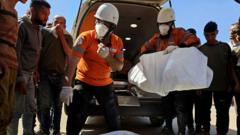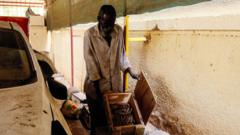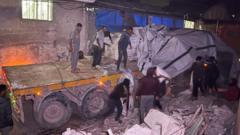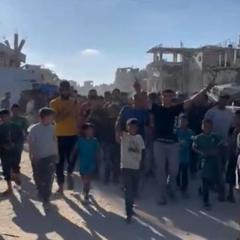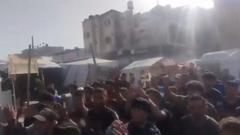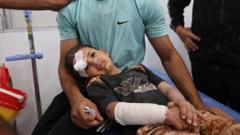Amid a partial lifting of Israel's blockade, food scarcity in Gaza has led to chaos and conflict, with armed looters targeting aid convoys while locals express frustration at insufficient aid distribution.
Chaos Erupts in Gaza as Food Shortages Prompt Desperation
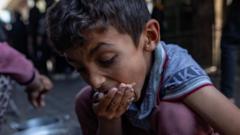
Chaos Erupts in Gaza as Food Shortages Prompt Desperation
A recent easing of Israel's blockade on Gaza has sparked tumultuous scenes, as food supplies remain critically low amidst growing insecurity and looting incidents involving humanitarian aid.
The limited amount of food that trickled into Gaza after an Israeli blockade was partly lifted has sparked chaotic scenes, as hunger continues to spread. Bakeries distributing food were overwhelmed by crowds and forced to close on Thursday, while armed looters attacked an aid convoy overnight, resulting in a firefight with Hamas security officials who, according to witnesses, were subsequently targeted by an Israeli drone strike.
This incident in central Gaza, recounted by eyewitnesses, local journalists, and Hamas officials, underscores the deteriorating security situation in the region, where governance has collapsed and lawlessness is rampant. A convoy consisting of 20 trucks, coordinated by the World Food Programme (WFP) and loaded with flour, was en route from the Kerem Shalom crossing to a WFP warehouse in Deir al-Balah. During its escort by six Hamas security officers, it was ambushed by five unidentified gunmen who shot at the tyres of the vehicles and attempted to seize the cargo. The Hamas personnel engaged the attackers in a brief firefight, which led to Israeli drone strikes targeting the Hamas unit, killing six officers and injuring others.
Hamas condemned the Israeli action as "a horrific massacre" and accused Israel of deliberately targeting those tasked with protecting humanitarian aid. A small amount of food has crossed into Gaza this week, with around 130 lorries delivering aid in the last three days following the partial easing of the blockade. However, according to the United Nations, Gaza requires approximately 500 to 600 trucks of supplies each day.
International agencies, including the UN and the WFP, warn that increasing insecurity is hindering the delivery of essential food and medical supplies to the majority of the displaced population. Israel asserts that the blockade aims to pressure Hamas into releasing hostages held in Gaza and has accused Hamas of stealing supplies, claims the group denies. Recently, the WFP reported that 15 of its aid trucks were looted on Thursday, emphasizing that "hunger, desperation, and anxiety over food aid availability are escalating insecurity."
With growing frustration over aid distribution methods, residents criticized the WFP and proposed that flour should be handed out directly to families instead of distributing baked bread, an approach they believe would allow families to bake at home or in tents, providing a safer alternative to overcrowded aid centers. Eyewitness accounts reveal a worsening humanitarian crisis as basic services collapse due to continuous military operations.
Abd al-Fatah Hussein, a displaced individual from al-Mawasi, conveyed through WhatsApp that the local situation is dire, "There is no electricity, no food, insufficient portable water, and no available medicine," he shared, adding that the ongoing airstrikes exacerbate their predicament. He described the incoming aid as negligible compared to Gaza's pressing needs.
Israeli Prime Minister Benjamin Netanyahu commented that only a "basic amount" of supplies would be permitted into the territory, while humanitarian organizations assert that the influx is far below what's necessary to sustain the 2.1 million residents. UN Secretary General Antonio Guterres stated that while 400 trucks had been cleared for entry, only a fraction had delivered supplies, with urgent needs remaining unaddressed.
Notably, reports from healthcare workers such as Rida, a midwife from Project HOPE, indicate that patients are arriving malnourished and struggling, often resorting to high-energy biscuits provided by charities. In Khan Younis, where mass evacuations were ordered, local teenager Saba Nahed Alnajjar reported no alternatives as her family chose not to leave their partially destroyed home.
As the conditions in Gaza deteriorate, residents lament the lack of food and essential supplies, emphasizing that the situation remains critical amid relentless bombardment and instability.


